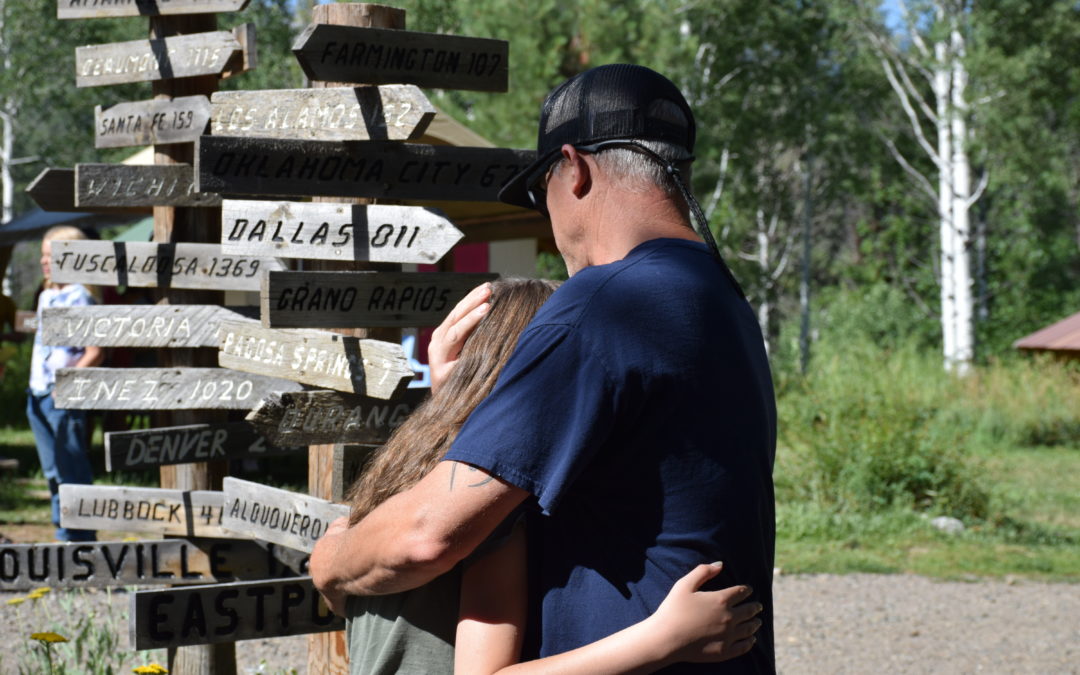ITK Tips: Missing Home
It’s easy to frame the emotions of “missing home” as “homesick”, emphasizing that it’s a sickness that should be fixed or healed. Sickness is scary and makes us feel bad. Yet missing home is a normal emotional response to thinking about family and those we love. As camp staff we can anticipate missing home in campers of all ages, and even our staff. It provides us an opportunity to teach hope. We can help campers feel “hopeful” about their own ability to overcome those sad moments when they are missing home. Hope is a significant part of developing resilience as a child. Hope can be defined as “The belief that your future is brighter than your past and that you play a part in shaping that future.” (Casey Gwinn and Chan Hellman in Hope Rising: How the Science of HOPE Can Change Your Life (2018)
So how do we help kids navigate missing home? Start with recognizing it. Symptoms may include depression, anxiety, withdrawn behavior, somatic complaints (infrequently), and acting-out behaviors (rarely). Cabin leaders are pretty good at detecting moderate and severe cases of missing home, but milder cases often go undetected. More than 95% of all campers report missing home on at least one day of their camp stay. It’s normal! Some 20% report moderate or severe levels of missing home. Only 7% have severe depressive and anxious symptoms due to missing home. Missing home is most commonly associated with withdrawn behaviors, anxious and depressed behaviors, and somatic complaints. Data suggest that girls show more acting out behaviors than boys. Not all kids who miss home display the symptoms. (Thurber, ACH MESH Resource Guide 2022)
Sonlight staff training includes how to help kids acknowledge their feelings of sadness when they miss home and experience it for what it is. We encourage kids to tell us they are missing home. And then acknowledge what parts they are missing. “I am missing my mom right now. She sits with me when I have a hard day.” And we allow kids to name the emotion “I am feeling sad right now because I am missing home.” Then we encourage kids to reflect on the good things that may have happened in the day “I loved getting to climb the new rock wall. And I made it to the top.” We encourage kids to have HOPE, looking towards the future “Tomorrow will be a good day because I’ll get to do activities with my best friend” Missing home is just one opportunity that camp provides to learn resilience, allowing kids to grow in their confidence that they can do hard things.
There can be moments when the anxiety of missing home and all of the “what ifs” get to be pretty loud. In these moments, whether with a staff member or by themselves, participants are encouraged to practice grounding strategies. Grounding practices are strategies to help someone refocus on the present moment instead of the strong emotions/anxious feelings. These strategies are best used when they are practiced at home before camp- we practice ahead of time so we are ready to use the strategy when we need it! A few ground practices are listed below.
Tips for Parents:
DO help your camper plan for those “missing home” moments. Ask them what they think would make them feel better: hug their stuffed animal, write a letter home, talk to their cabin leader. Giving them power, agency and autonomy to help define what they can do to help them feel better is empowering.
DO write them encouraging letters. You can tell them you miss them, but be uplifting, and tell them you can’t wait to hear all that they have learned, and the good things they loved about camp.
DO let them know that missing home is normal. Remind yourself that if you receive a “sad letter” time has passed, and they may be well past those sad feelings.
DON’T Promise them that you’ll come pick them up if they are missing home or sad. Kids who believe that is an option will have a harder time fully engaging, and learning those skills of resilience and hope.
DON’T Promise them that they can call home. Evidence is clear that calls home are not helpful, and almost always make the situation worse.
DON’T write to kids about the things that they are missing out on, or things that are not getting done while they are gone. (“I hope your Dad remembers to do your job of feeding the dog while you are at camp”) It doesn’t make us feel good when we are missing out on things. It doesn’t make kids feel good either.
TIPS for Kids
DO tell your cabin leader or a camp staff member if you are feeling sad, and missing home
DO think about your missing home plan. Would you like to write a letter to your mom, dad, a grandparent or a pet? Would you like to sit with your stuffed animal for a few minutes?
DO think about the activities that are coming up, and which ones you are most excited about.
DO keep a gratitude journal. Write down one thing every day that you are grateful for.
DO tell your friends you are missing home. They may be missing home also, and together you can find a fun thing to do. Maybe some hammock time together. Or a cup of hot chocolate in the lodge.
Grounding Practices
A few can-do-anywhere strategies! If you anticipate your child may miss home, you can practice before they go to camp.
5, 4, 3, 2, 1
- Name 5 things you can see,
- Name 4 things you can hear
- Name 3 things you can smell
- Name 2 things you can taste
- Name 1 thing you could feel
There are a few different variations of this, the goal is to focus on your immediate surroundings
Hand Tracing
With one hand, you face your palm up towards the sky. With your other hands pointer finger, you place your pointer finger at the base of your thumb on the other hand. Then you trace around all of your fingers. As you move up the finger(s), you breathe in. As you move down the finger(s), your breath out until you circle back around to the base of your thumb.
Box Breathing
Box breathing, or tactical breathing, gets its name because some people like to picture drawing a four-by-four box in their mind when practicing this technique. To practice, simply inhale for four counts, hold for four counts, and exhale for four counts. Repeat as long as you need.

